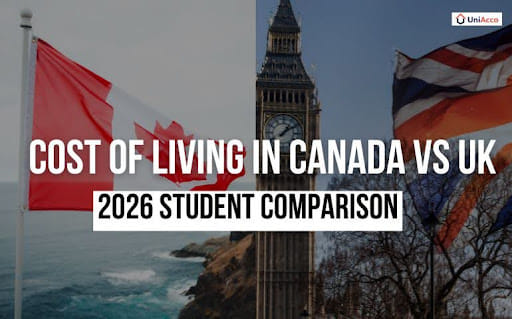Explore the comprehensive guide on the cost of living in Nova Scotia, Canada for students. If you’re considering studying in Nova Scotia or already a student in the province, it’s important to have a clear understanding of the cost of living to effectively manage your finances. Nova Scotia offers a vibrant and inclusive student community, and by understanding the expenses associated with rent, tuition, transportation, food, entertainment, and more, you can make informed decisions and plan your budget accordingly.
Cost Of Living Calculator
| Description | Cost (£) |
|---|---|
| Total Cost of Accommodation | 100 |
| Total Cost of Transport | 50 |
| Total Cost of Utilities | 30 |
| Total Cost of Food | 70 |
| Total Estimated Cost | 250 |
What Is The Cost of Living in Nova Scotia Canada For Students?
Nova Scotia provides a diverse range of educational opportunities, but it’s important to have an understanding of the expenses you will encounter as a student in the province.
| Item | Cost (Per Month in CAD $) |
| Off-Campus Accommodation | 960 – 1000 |
| On-Campus Accommodation | 1,000 – 1500 |
| Transportation | 80 – 90 |
| Food | 720 – 800 |
| Entertainment | 60 – 85 |
| Groceries | 80 – 100 |
| Clothes | 142 |
Groceries
When living in Nova Scotia as an international student, managing your grocery budget is key to balancing a healthy lifestyle with your finances. From local markets to larger supermarkets, you will find a variety of affordable options to suit your needs. Nova Scotia is known for its fresh produce and diverse food options, allowing students to enjoy quality groceries without breaking the bank. Understanding where and how to shop smartly will make your stay in this beautiful province even more enjoyable!
| Particulars | Prices |
| Milk (regular), (1 litre) | 1.50 – 3 |
| Loaf of Fresh White Bread (500g) | 3 – 5 |
| Rice (white), (1kg) | 5 – 6 |
| Eggs (regular) (12) | 4 – 6 |
| Local Cheese (1kg) | 12 – 15 |
| Chicken Fillets (1kg) | 15 – 20 |
| Beef Round (1kg) (or Equivalent Back Leg Red Meat) | 18 – 20 |
| Apples (1kg) | 5 – 7 |
| Banana (1kg) | 2 – 4 |
| Oranges (1kg) | 5 – 6 |
| Tomato (1kg) | 6 – 7 |
| Potato (1kg) | 3 – 4 |
| Onion (1kg) | 3 – 4 |
| Lettuce (1 head) | 2 – 4 |
| Water (1.5 litre bottle) | 2 – 3 |
| Bottle of Wine (Mid-Range) | 18 – 20 |
| Meal, Inexpensive Restaurant | 20 – 25 |
| Meal for 2 People, Mid-range Restaurant, Three-course | 90 – 100 |
| McMeal at McDonalds (or Equivalent Combo Meal) | 12 – 15 |
Transportation
Transportation in Nova Scotia is student-friendly and offers a variety of options to get around efficiently. Whether you are staying in student accommodation or other nearby areas, public transport is accessible and affordable. Students can benefit from discounted transit passes, making it easier to explore the city and commute to classes. Taxis, ride-sharing services, and cycling are also popular choices for short trips around town.
| Particulars | Prices |
| One-way fare (local transport) | 2.50 – 3 |
| Monthly pass (standard rate) | 80 – 90 |
| Taxi 1-hour waiting time (regular tariff) | 30 – 35 |
Utilities
Utilities in Nova Scotia student accommodations are designed to make your life hassle-free and comfortable.Students accommodations such as UniAcco include essential services like electricity, heating, cooling, water, and waste management in the rent, so you will not have to worry about juggling multiple bills each month. With reliable high-speed internet also widely available, staying connected for studies or entertainment is very convenient.
| Particulars | Prices |
| Basic utilities (electricity, heating, cooling, water, garbage) for an 85m² apartment | 200 – 300 |
| Monthly mobile phone plan with calls and 10GB+ data | 70 – 80 |
| Internet (60 Mbps or higher, unlimited data, cable/ADSL) | 100 – 110 |
Leisure And Entertainment
Leisure and entertainment in Nova Scotia offer students a mix of activities to unwind and have fun after a busy week of studying. From weekend tennis games to enjoy local music, you will find plenty of ways to make the most of your downtime while living here.
| Particulars | Prices |
| Monthly gym membership for one adult | 70 – 80 |
| Tennis court rental (1 hour on a weekend) | 15 – 20 |
| Movie ticket for an international release (single seat) | 12 – 15 |
Cost Of Studying In Canada
Studying in Canada is an exciting and rewarding experience, offering international students access to world-class universities and a range of top-tier courses. From renowned institutions to advanced programmes, Canada has much to offer for those seeking academic excellence and personal growth. Below, you will find a comprehensive breakdown of the leading universities, popular courses, programme durations, and tuition fees, helping you plan your educational journey in this vibrant and welcoming country.
| University | Course Name | Duration | Tuition Fees (CAD) |
| University of Toronto | MBA | 2 years | €66,000 |
| MSc in Computer Science MBA | 2 years | €8,000 to €15,000 | |
| University of British Columbia | MBA | 16 months | €66,000 |
| MSc in Data Science | 1 year | €8,000 to €15,000 | |
| McGill University | MBA | 1 year | €58,000 |
| MSc in Computer Science | 2 years | €18,000 | |
| McMaster University | MBA | 2 years | €50,000 |
| MSc in Health Sciences | 2 years | €22,000 | |
| University of Alberta | MBA | 2 years | €43,000 |
| MSc in Engineering | 2 years | €8,500 | |
| University of Montreal | MBA | 1 year | €45,000 |
| University of Waterloo | MSc in Computer Science | 2 years | €15,000 to €20,000 |
Cost Of Healthcare In Nova Scotia
Healthcare in Nova Scotia is essential to understand, especially for those planning to move or study in the province. Whether you are preparing for routine check-ups or emergency medical care, being informed about healthcare costs and insurance options is key to ensuring you are fully protected during your time in the province.
| Category | Details |
| Annual Premium | Approx. $650 for 12 months of coverage (varies by plan and provider). |
| Emergency Medical Costs | – Doctor’s appointment: ~$120 – Hospitalisation: Over $3,700 |
| Health Insurance Options | – Institutional Plans: Offered by educational institutions, may be mandatory, cover emergency services, preventive care, and sometimes dental services.- Private Insurance: Available for students arriving before institutional coverage starts or those opting out of the institutional plan. |
| Eligibility for Provincial Coverage | After 12 months of full-time study in Nova Scotia, students may apply for the Nova Scotia Medical Services Insurance (MSI), which provides basic health care without premiums. |
| Additional Coverage | Students are encouraged to consider extended health coverage for comprehensive protection during their studies. |
In conclusion, understanding the cost of living in Nova Scotia is essential for students planning to pursue their education in the province. From tuition fees and housing to daily expenses like food and transportation, being financially prepared allows students to focus on their studies and enjoy their time in this lively region. While the overall cost may vary depending on individual lifestyle choices and location, careful budgeting and planning can make a significant difference.
FAQs
How much money do you need to make to live comfortably in Nova Scotia?
To live comfortably in Nova Scotia, on average, a single person should earn around $45,000 to $50,000 annually to cover basic expenses.
Is Nova Scotia a good place to live for Indians?
Yes, Nova Scotia is a great place for Indians to live, offering a high quality of life, affordable living, strong community support, and excellent education and healthcare services. Its cultural diversity and welcoming atmosphere make it an attractive choice for international residents.
What is the minimum wage in Nova Scotia?
The current minimum wage in Nova Scotia is $15.20 per hour. This rate ensures fair compensation for workers across the province.
Is moving to Canada a good idea?
Yes, moving to Canada is a good idea. It consistently ranks high in global surveys on safety, progress, and quality of life, and is often among the top 10 safest countries according to the Global Peace Index.
Is 60000 a good salary in Nova Scotia?
Yes, a salary of $60,000 in Nova Scotia is considered good. In Halifax, it’s 13.4% higher than the average salary, with a take-home pay of about $43,610.















0 Comments